| Listing 1 - 10 of 12 | << page >> |
Sort by
|
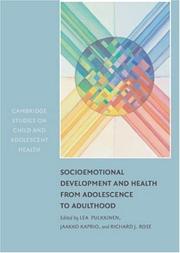
ISBN: 9780511499784 9780521846318 9780521367998 0511499787 9780511226182 0511226187 0511222963 9780511222962 0511242611 9780511242618 0511224974 9780511224973 051122561X 9780511225611 9780511224300 0511224303 0521846315 0521846315 0521367999 1107164214 9781107164215 1280541318 9781280541315 0511317107 9780511317101 Year: 2006 Publisher: Cambridge : Cambridge University Press,
Abstract | Keywords | Export | Availability | Bookmark
 Loading...
Loading...Choose an application
- Reference Manager
- EndNote
- RefWorks (Direct export to RefWorks)
This 2006 book is based on two longitudinal studies of behavior development, both conducted in Finland, a living laboratory setting for longitudinal research. Much of the book reports results from a longitudinal study begun in JyvaÌskylaÌ, Finland, in 1968, when its participants were school children. This longitudinal study is complemented by two Finnish twin-family studies, with parallel measures and overlapping aims, to yield insights into genetic and environmental sources of variation in early development and later outcomes. An array of findings from the two sets of longitudinal studies are presented, set within a theoretical framework of socioemotional development, and focused on both individual and familial predictors of health-related outcomes from childhood to early adulthood. Many contributors to this edited volume represent a second-tier of Finnish-USA collaborators. They analyzed data from the longitudinal studies as part of their advanced training, and their contributions to the book report results of such analyses.
Personality development --- Developmental psychology --- Development (Psychology) --- Developmental psychobiology --- Psychology --- Life cycle, Human --- Character development --- Character formation --- Development, Character --- Development, Personality --- Formation, Character --- Child psychology --- Social aspects. --- Longitudinal studies. --- Health Sciences --- Psychiatry & Psychology
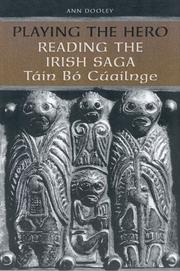
ISBN: 1282023527 9786612023521 1442678534 9781442678538 9780802038326 0802038328 9781282023529 148752546X Year: 2006 Publisher: Toronto [Ont.] University of Toronto Press
Abstract | Keywords | Export | Availability | Bookmark
 Loading...
Loading...Choose an application
- Reference Manager
- EndNote
- RefWorks (Direct export to RefWorks)
In Playing the Hero, Ann Dooley examines the surviving manuscript versions of the greatest of the early Irish sagas, the Táin Bó Cuailnge (Cattle-Raid of Cooley), and creates a picture of the cultural conditions and literary mind-sets under which medieval scribes recreated the text. Dooley argues that the scribes' work is both a transmission and a translation, and that their own changing historical circumstances within the space of one hundred years, from the beginning to the end of the twelfth century, determines the specifics of their literary creativity.Playing the Hero is a unique example of more contemporary literary methodologies - post-structuralist, feminist, historicist and beyond - being used to illuminate the Irish saga world. Dooley provides a commentary for the saga, helping to re-animate its literary sophistication. Her work is an interrogation of both the Irish epic hero - a reading of the male through the medium of feminine discourse - and the process whereby violence as normalized in the saga genre can be recovered as problematic and troubling. Dooley's work is groundbreaking and will provoke a wide response in Medieval Irish studies.
Cuchulain (Legendary character) --- Cuchulain (Legendary character). --- Epic literature, Irish --- Mythology, Celtic, in literature. --- HISTORY / Medieval. --- Cu Chulainn (Legendary character) --- Cuchulinn (Legendary character) --- Cuchullin (Legendary character) --- Legends --- History and criticism. --- Táin bó Cúailnge. --- Leabhar na h-uidhri. --- Yellow Book of Lecan. --- Book of Leinster. --- Cattle-raid of Cooley --- Táin Bó Cualnge --- Cualnge cattle-raid --- Ulster cycle --- Ireland --- In literature.
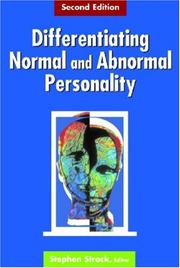
ISBN: 1280753080 9786610753086 0826132073 9780826132079 9780826132062 0826132065 Year: 2006 Publisher: New York : Springer Pub.,
Abstract | Keywords | Export | Availability | Bookmark
 Loading...
Loading...Choose an application
- Reference Manager
- EndNote
- RefWorks (Direct export to RefWorks)
With graduate students and professionals new to the field in mind, this book provides information about the central issues that are being addressed by researchers and clinicians in the realm of normal-abnormal personality today. In addition, it provides essential terminology, ideas, and methods that are unique to the field at large as well as basic tools needed to become a participant in normal-abnormal psychology. Key Features: * Seven influential models of personality and psychopathology * Four statistical methods for use in taxonomy, diagnosis, similarities and differences between normal
Personality tests. --- Personality disorders --- Personality assessment. --- Assessment of personality --- Personality diagnosis --- Personality evaluation --- Psychodiagnostics --- Character tests --- Educational tests and measurements --- Neuroses --- Personality assessment --- Psychological tests --- Diagnosis. --- Diagnosis
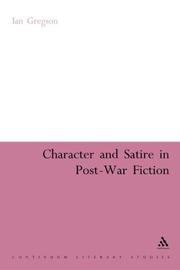
ISBN: 1472542312 1281295108 9786611295103 1847142133 9781847142139 0826487475 9780826487476 9781472542311 9781847062659 1847062652 9781441130006 1441130004 9786612024467 1282024469 Year: 2006 Publisher: London New York Continuum
Abstract | Keywords | Export | Availability | Bookmark
 Loading...
Loading...Choose an application
- Reference Manager
- EndNote
- RefWorks (Direct export to RefWorks)
This monograph analyses the use of caricature as one of the key strategies in narrative fiction since the war. Close analysis of some of the best known postwar novelists including Toni Morrison, Philip Roth, Joyce Carol Oates, Angela Carter and Will Self, reveals how they use caricature to express postmodern conceptions of the self. In the process of moving away from the modernist focus on subjectivity, postmodern characterisation has often drawn on a much older satirical tradition which includes Hogarth and Gillray in the visual arts, and Dryden, Pope, Swift and Dickens in literature. Its key images depict the human as reduced to the status of an object, an animal or a machine, or the human body as dismembered to represent the fragmentation of the human spirit. Gregson argues that this return to caricature is symptomatic of a satirical attitude to the self which is particularly characteristic of contemporary culture
English fiction --- American fiction --- Satire, English --- Satire, American --- Character in literature. --- Caricature in literature. --- World War, 1939-1945 --- History and criticism. --- Influence.
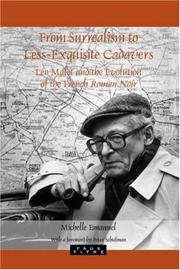
ISBN: 9042020806 9789042020801 940120344X 1429481110 9781429481113 9789401203449 Year: 2006 Volume: 288 Publisher: Leiden; Boston : BRILL,
Abstract | Keywords | Export | Availability | Bookmark
 Loading...
Loading...Choose an application
- Reference Manager
- EndNote
- RefWorks (Direct export to RefWorks)
Les nouveaux mystères de Paris (1954-1959), Léo Malet's fifteen-novel detective series inspired by Eugène Sue's nineteenth-century feuilleton , almost achieved the goal of setting a mystery in each of the twenty Parisian arrondissements, with Nestor Burma at the center of the action. In Burma, the "détective de choc" first introduced in 1943's 120 rue de la gare , Malet, considered the "father" of the French roman noir , creates a cultural hybrid, bringing literary references and surrealist techniques to a criminal milieu. Michelle Emanuel's groundbreaking study is particularly insightful in its treatment of Malet as a pioneer within the literary genre of the French roman noir while making sure to also focus on his surrealist roots. Against the archetypes of Simenon's Maigret and Christie's Poirot, Burma is brash and streetwise, peppering his speech with colorful and evocative slang. As the reader's tour guide, Burma highlights Paris's forgotten past while providing insight to the Paris of (his) present, referencing both popular culture and contemporary issues. Malet's innovation of setting a noir narrative in France serves as a catalyst for further change in the policier genre in France, including his contemporary Jean Amila, the néo-polar of Jean-Patrick Manchette, and the historical roman noir of Didier Daeninckx.
Burma, Nestor (Fictitious character). --- Detective and mystery stories, French --- Gothic revival (Literature) --- Surrealism (Literature) --- History and criticism. --- Malet, Léo, --- Malet, Léo. --- Criticism and interpretation. --- Paris (France) --- In literature. --- Malet, Léo --- French literature --- History and criticism --- Malet, Léo, --- In literature --- Detective and mystery stories, French. --- Literature, Experimental --- Avant-garde literature --- Experimental literature --- Avant-garde (Aesthetics) --- Modernism (Literature) --- Literary style --- French detective stories --- French mystery stories --- French fiction --- Malet, Léon Jean, --- Harding, Frank, --- Refreger, Omer, --- Doucet, Lionel, --- Latimer, Leo, --- Burma, Nestor (Fictitious character) --- Surrealism in literature --- Literature --- Literary movements --- Revival movements (Art) --- Romanticism --- Nestor Burma (Fictitious character) --- Detective and mystery stories, French - History and criticism --- French literature - 20th century - History and criticism. --- Malet, Léo, - 1909 --- -Paris (France) - In literature --- -Paris (France)
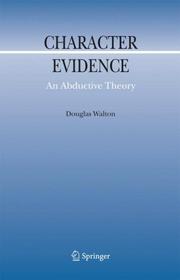
ISBN: 128106744X 9786611067441 1402049439 1402049420 9048172357 Year: 2006 Volume: v. 11 Publisher: Dordrecht : Springer Netherlands : Imprint: Springer,
Abstract | Keywords | Export | Availability | Bookmark
 Loading...
Loading...Choose an application
- Reference Manager
- EndNote
- RefWorks (Direct export to RefWorks)
This book is on evidence for character judgments, answering questions about how such judgments are and should be supported or refuted by verifiable evidence. For example, if I claim that some particular person has integrity, or does not, what kind of justification should properly be used to support or refute the claim? This book answers the question using a model of abductive reasoning, commonly called inference to the best explanation. The methodology of the book derives from recent work on models of reasoning in argumentation theory and artificial intelligence. The aim is not just to show how character judgments are made, but to show how they should be properly be made based on sound reasoning, in order to avoid errors and superficial judgments of a kind that are common. Character evidence in law is on a razor’s edge. It is generally inadmissible, for it might tend to prejudice a jury, but it is a kind of evidence often needed in trials, for example, to cross-examine a witness. This book shows that we are not as good at judging character as we think, and often make serious mistakes. But it is shown how character judgments can, in some instances, be based on good reasoning supported by factual evidence in a case.
Reputation (Law) --- Examination of witnesses --- Abduction (Logic) --- Artificial intelligence. --- Psychological aspects. --- AI (Artificial intelligence) --- Artificial thinking --- Electronic brains --- Intellectronics --- Intelligence, Artificial --- Intelligent machines --- Machine intelligence --- Thinking, Artificial --- Bionics --- Cognitive science --- Digital computer simulation --- Electronic data processing --- Logic machines --- Machine theory --- Self-organizing systems --- Simulation methods --- Fifth generation computers --- Neural computers --- Logic --- Reasoning --- Syllogism --- Evidence (Law) --- Trial practice --- Witnesses --- Evidence, Character --- Fama publica --- Character evidence --- Law and legislation --- Philosophy of law. --- Criminal Law. --- Philosophy of Law. --- Theories of Law, Philosophy of Law, Legal History. --- Criminal Law and Criminal Procedure Law. --- Crime --- Crimes and misdemeanors --- Criminals --- Law, Criminal --- Penal codes --- Penal law --- Pleas of the crown --- Public law --- Criminal justice, Administration of --- Criminal procedure --- Legal status, laws, etc. --- Political science. --- Law—Philosophy. --- Law. --- Criminal law. --- Acts, Legislative --- Enactments, Legislative --- Laws (Statutes) --- Legislative acts --- Legislative enactments --- Jurisprudence --- Legislation --- Administration --- Civil government --- Commonwealth, The --- Government --- Political theory --- Political thought --- Politics --- Science, Political --- Social sciences --- State, The
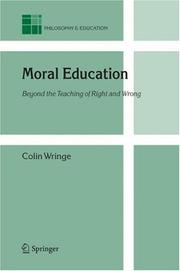
ISBN: 1280461225 9786610461226 1402037090 1402037082 1402061803 Year: 2006 Volume: v. 14 Publisher: Dordrecht : Springer Netherlands : Imprint: Springer,
Abstract | Keywords | Export | Availability | Bookmark
 Loading...
Loading...Choose an application
- Reference Manager
- EndNote
- RefWorks (Direct export to RefWorks)
Moral Education Beyond the Teaching of Right and Wrong By Colin Wringe Keele University, UK PHILOSOPHY AND EDUCATION This volume is unique in providing a comprehensive discussion of moral education in the light of a range of ethical theories. In a balanced, thoughtful and penetrating account, all of these are shown to have a contribution to make to our moral understanding, and hence to moral education, even if none provides a definitive criterion of moral conduct. Though divine command is rejected as a source of moral justification, the possible contribution of some religious traditions to moral education is sympathetically considered. Fashionable relativism and recent moves towards inculcatory authoritarianism are both firmly rejected. The argument is philosophically rigorous throughout. Contemporary issues addressed include the links between personal morality and citizenship, including world citizenship, family values and sexual morality. A final chapter considers some of the practical concerns of the moral educator. The language is lucid and concise and, though written with professional philosophers of education and teacher educators in mind, the text will be readily accessible to practising teachers and those in training, as well as to members of the general public concerned for the moral education of the next generation. This volume is for professional philosophers of education and teacher educators, as well as for school teachers and administrators, teachers in training and other education students. Reviewers’ comments: "It cautions against the current tendency to reduce moral education to a set of specific rules and behaviours" [and is to be praised for] "its emphasis on the complexity of the moral life and its openness to a variety of views." "Its critiques (of recent discussions of moral education) are well done." [It also] "contains an excellent review of current moral theory." "I found these chapters valuable . . . because they provide first rate formulations and discussions of the views taken up. I do not know of a better review of contemporary moral theory. It is thoroughly well written and well argued…Wringe does an excellent job of developing an even handed critique. The final chapters on citizenship are also well done." "I think the main contribution of this book is to pull together a body of philosophical material relevant to moral education in one place and to provide an invariably competent and readable discussion and critique of this material." "In fact, it is superbly written.".
Moral education. --- Education. --- Children --- Education, Primitive --- Education of children --- Human resource development --- Instruction --- Pedagogy --- Schooling --- Students --- Youth --- Civilization --- Learning and scholarship --- Mental discipline --- Schools --- Teaching --- Training --- Education --- Character education --- Ethical education --- Child rearing --- Ethics --- Religious education --- Ethics. --- Educational Philosophy. --- Teaching and Teacher Education. --- Philosophy. --- Deontology --- Ethics, Primitive --- Ethology --- Moral philosophy --- Morality --- Morals --- Philosophy, Moral --- Science, Moral --- Philosophy --- Values --- Education—Philosophy. --- Teaching. --- Didactics --- School teaching --- Schoolteaching --- Instructional systems --- Pedagogical content knowledge
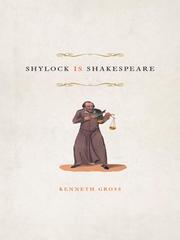
ISBN: 1281957038 9786611957032 0226309924 9780226309927 0226309770 9780226309774 Year: 2006 Publisher: Chicago : University of Chicago Press,
Abstract | Keywords | Export | Availability | Bookmark
 Loading...
Loading...Choose an application
- Reference Manager
- EndNote
- RefWorks (Direct export to RefWorks)
Shylock, the Jewish moneylender in The Merchant of Venice who famously demands a pound of flesh as security for a loan to his antisemitic tormentors, is one of Shakespeare's most complex and idiosyncratic characters. With his unsettling eloquence and his varying voices of protest, play, rage, and refusal, Shylock remains a source of perennial fascination. What explains the strange and enduring force of this character, so unlike that of any other in Shakespeare's plays? Kenneth Gross posits that the figure of Shylock is so powerful because he is the voice of Shakespeare himself. Marvelously speculative and articulate, Gross's book argues that Shylock is a breakthrough for Shakespeare the playwright, an early realization of the Bard's power to create dramatic voices that speak for hidden, unconscious, even inhuman impulses-characters larger than the plays that contain them and ready to escape the author's control. Shylock is also a mask for Shakespeare's own need, rage, vulnerability, and generosity, giving form to Shakespeare's ambition as an author and his uncertain bond with the audience. Gross's vision of Shylock as Shakespeare's covert double leads to a probing analysis of the character's peculiar isolation, ambivalence, opacity, and dark humor. Addressing the broader resonance of Shylock, both historical and artistic, Gross examines the character's hold on later readers and writers, including Heinrich Heine and Philip Roth, suggesting that Shylock mirrors the ambiguous states of Jewishness in modernity. A bravura critical performance, Shylock Is Shakespeare will fascinate readers with its range of reference, its union of rigor and play, and its conjectural-even fictive-means of coming to terms with the question of Shylock, ultimately taking readers to the very heart of Shakespeare's humanizing genius.
LITERARY CRITICISM / General. --- Shakespeare, William, --- Shylock --- Шейлок --- Sheĭlok --- Shakespeare, William --- Shakespear, William, --- Shakspeare, William, --- Šekʻspiri, Uiliam, --- Saixpēr, Gouilliam, --- Shakspere, William, --- Shikisbīr, Wilyam, --- Szekspir, Wiliam, --- Šekspyras, --- Shekspir, Vilʹi︠a︡m, --- Šekspir, Viljem, --- Tsikinya-chaka, --- Sha-shih-pi-ya, --- Shashibiya, --- Sheḳspir, Ṿilyam, --- Shaḳspir, Ṿilyam, --- Syeiksŭpʻio, --- Shekspir, V. --- Szekspir, William, --- Shakespeare, Guglielmo, --- Shake-speare, William, --- Sha-ō, --- Şekspir, --- Shekspir, Uiliam, --- Shekspir, U. --- Šekspir, Vilijam, --- Ṣēkspiyar, Viliyam, --- Shakspir, --- Shekspyr, Vyli︠e︡m, --- Şekspir, Velyam, --- Ṣēkspiyar, Villiyam, --- Shēkʻspʻiyr, Vlilliam, --- Ṣēkspiyar, --- Ṣēkspiyar Mahākavi, --- Ṣēkspiyar Mahākaviya, --- Sheḳspier, Ṿilyam, --- Shēkʻspir, --- Shakespeare, --- Śeksper, --- Шекспир, Вильям, --- Шекспир, Уильям, --- שייקספיר, וויליאם, --- שייקספיר, וו., --- שיקספיר, וויליאם --- שיקספיר, ויליאם --- שיקספיר, ויליאם, --- שכספיר, ויליאם, --- שכספיר, וילים, --- שכספיר, ו׳ --- שעפקספיר, וויליאם, --- שעקספיער, וויליאם --- שעקספיער, וויליאם, --- שעקספיער, ווילליאם --- שעקספיער, וו., --- שעקספיר --- שעקספיר, וו --- שעקספיר, וויליאם, --- שעקספיר, וויליאמ --- שעקספיר, ווילליאם --- שעקספיר, ווילליאם, --- שעקספיר, וו., --- שעקספיר, װיליאם, --- שעקספיר, װילליאם, --- שעקספיר, װ., --- שעקספער --- שעקספער, וויליאמ --- שקספיר --- שקספיר, וו --- שקספיר, וויליאם --- שקספיר, וויליאם, --- שקספיר, ווילים, --- שקספיר, וילאם --- שקספיר, ויליאם --- שקספיר, ויליאם, --- שקספיר, ויליים, --- שקספיר, וילים --- שקספיר, וילים, --- شاكسبير، وليم --- شاكسپير، وليم --- شكسبير، وليام --- شكسبير، وليم --- شكسبير، وليم، --- شكسبير، و. --- شكسپير، وليم --- شكسپير، ويليام --- شيكسبير، وليام --- شيكسبير، وليام.، --- شيكسبير، وليم --- شکسبير، وليم --- وليم شکسبير --- 沙士北亞威廉姆, --- 沙士比亞威廉姆, --- 莎士比亞威廉姆, --- 莎士比亞威廉, --- 莎士比亞, --- Jacobson, Howard. --- Castelnuovo-Tedesco, Mario, --- Tchaikowsky, André, --- Harbison, John. --- Nystroem, Gösta, --- Characters --- Shylock. --- Shylock (Fictitious character) --- Shylock (Fictitious character). --- shylock, shakespeare, character study, literature, canon, judaism, jewish, antisemitism, difference, outcast, dark humor, ambivalence, isolation, ambiguity, rage, protest, drama, theater, performing arts, refusal, ambition, generosity, vulnerability, need, wealth, debt, obligation, revenge, cruelty, unconscious, desire, passion, modernity, identity, philip roth, heinrich heine, merchant of venice, complicity, conversion.
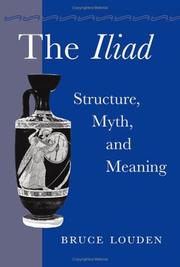
ISBN: 080188280X 9780801882807 0801889189 9780801889189 Year: 2006 Publisher: Baltimore, Md. Johns Hopkins University Press
Abstract | Keywords | Export | Availability | Bookmark
 Loading...
Loading...Choose an application
- Reference Manager
- EndNote
- RefWorks (Direct export to RefWorks)
Extending his distinctive analysis of Homeric epic to the & Iliad&, Bruce Louden, author of & The "Odyssey": Structure, Narration, and Meaning,& again presents new approaches to understanding the themes and story of the poem. In this thought-provoking study, he demonstrates how repeated narrative motifs argue for an expanded understanding of the structure of epic poetry. First identifying the "subgenres" of myth within the poem, he then reads these against related mythologies of the Near East, developing a context in which the poem can be more accurately interpreted. Louden begins by focusing on the ways in which the & Iliad& 's three movements correspond with and comment on each other. He offers original interpretations of many episodes, notably in books 3 and 7, and makes new arguments about some well-known controversies (e.g., the duals in book 9), the & Iliad& 's use of parody, the function of theomachy, and the prefiguring of Hektor as a sacrificial victim in books 3 and 6. The second part of the book compares fourteen subgenres of myth in the & Iliad& to contemporaneous Near Eastern traditions such as those of the Old Testament and of Ugaritic mythology. Louden concludes with an extended comparison of the Homeric Athena and Anat, a West Semitic goddess worshipped by the Phoenicians and Egyptians. Louden's innovative method yields striking new insights into the formation and early literary contexts of Greek epic poetry. &
Epic poetry, Greek --- Achilles (Greek mythology) in literature --- Trojan War --- Rhetoric, Ancient --- History and criticism --- Literature and the war --- Homer. --- Achilles (Greek mythology) in literature. --- Rhetoric, Ancient. --- History and criticism. --- Literature and the war. --- Achille (Mythologie grecque) dans la littérature --- Achilles (Griekse mythologie) in de literatuur --- Ancient rhetoric --- Antieke retoriek --- Retoriek [Antieke ] --- Retoriek van de Oudheid --- Rhetoric [Ancient ] --- Rhétorique ancienne --- Rhétorique de l'Antiquité --- Classical languages --- Greek language --- Greek rhetoric --- Latin language --- Latin rhetoric --- Rhetoric --- Epic poetry [Greek ] --- Homer --- Epic poetry, Greek - History and criticism --- Trojan War - Literature and the war --- Homer - Iliad --- Achilles (Mythological character) --- In literature.
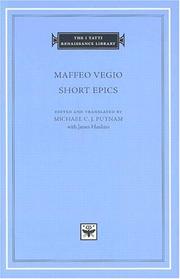
ISBN: 9780691125374 0691125376 9780674014831 9786612129698 1282129694 1400827426 0674014839 9781400827428 9780691125376 Year: 2006 Volume: 15 Publisher: Princeton Princeton university press
Abstract | Keywords | Export | Availability | Bookmark
 Loading...
Loading...Choose an application
- Reference Manager
- EndNote
- RefWorks (Direct export to RefWorks)
"The lives of Catullus and Horace overlap by a dozen years in the first century BC. Yet, though they are the undisputed masters of the lyric voice in Roman poetry, Horace directly mentions his great predecessor, Catullus, only once, and this reference has often been taken as mocking. In fact, Horace's allusion, far from disparaging Catullus, pays him a discreet compliment by suggesting the challenge that his accomplishment presented to his successors, including Horace himself. In Poetic Interplay, the first book-length study of Catullus's influence on Horace, Michael Putnam shows that the earlier poet was probably the single most important source of inspiration for Horace's Odes, the later author's magnum opus. Except in some half-dozen poems, Catullus is not, technically, writing lyric because his favored meters do not fall into that category. Nonetheless, however disparate their preferred genres and their stylistic usage, Horace found in the poetry of Catullus, whatever its mode of presentation, a constant stimulus for his imagination. And, despite the differences between the two poets, Putnam's close readings reveal that many of Horace's poems echo Catullus verbally, thematically, or both. By illustrating how Horace often found his own voice even as he acknowledged Catullus's genius, Putnam guides us to a deeper appreciation of the earlier poet as well"--Provided by publisher.
Helen of Troy (Greek mythology) in literature. --- Influence (Literary, artistic, etc.). --- Odes, Latin --- Hélène (Mythologie grecque) dans la littérature --- Influence littéraire, artistique, etc. --- Odes latines --- History and criticism. --- Histoire et critique --- Horace --- Catullus, Gaius Valerius --- Virgil --- Knowledge --- Literature. --- Influence. --- In literature. --- Rome --- Rome dans la littérature --- Helen of Troy (Greek mythology) in literature --- Influence (Literary, artistic, etc.) --- Odes --- History and criticism --- Literature --- Influence --- In literature --- Hélène (Mythologie grecque) dans la littérature --- Influence littéraire, artistique, etc. --- Rome dans la littérature --- Artistic impact --- Artistic influence --- Impact (Literary, artistic, etc.) --- Literary impact --- Literary influence --- Literary tradition --- Tradition (Literature) --- Vergil --- Virgile --- Virgilio Máron, Publio --- Virgilius Maro, Publius --- Vergili Maronis, Publius --- Catul --- Catull --- Catulle --- Catulli, C. Valerii --- Catullo, Gaio Valerio --- Catullus, C. Valerius --- Catullus, Gaius Valerius, --- Catullus, Gajus Valerius --- Catulo --- Katull, Gaǐ Valeriǐ --- Katullus, Kaius Valerius --- Valerio Cátulo, Cayo --- Катулл --- Orazio --- Horacij Flakk, Kvint --- Epic poetry, Latin (Medieval and modern) --- Astyanax (Legendary character) --- Jason (Greek mythology) --- Poésie épique latine médiévale et moderne --- Astyanax (Personnage légendaire) --- Enée (Personnage légendaire) --- Jason (Mythologie grecque) --- Vegio, Maffeo, --- Anthony, --- Poésie épique latine médiévale et moderne --- Astyanax (Personnage légendaire) --- Enée (Personnage légendaire) --- Lyric poetry --- Poetry --- Art --- Influence (Psychology) --- Intermediality --- Intertextuality --- Originality in literature --- Helen, --- Elena, --- Helena, --- Helenē, --- Yelena, --- 海伦 , --- ヘレネー, --- הלנה, --- העלענע, --- 헬레네, --- Хелена, --- Єлена, --- Елена , --- هلن, --- هيلين, --- Ἑλένη, --- Aeneas (Legendary character) --- Latin epic poetry, Medieval and modern --- Latin poetry, Medieval and modern --- Scamandrius (Legendary character) --- Legends --- Veggius, Mapheus, --- Vegius, Mapheus, --- Anbā Anṭūnīyūs, --- Anthony the Abbot, --- Antoine, --- Antoniĭ Velikiĭ, --- Antonio, --- Antonius, --- Antonius Magnus, --- Antony, --- Qiddīs Anṭūnīyūs, --- قديس مصر أنطونيوس --- Horatius Flaccus, Quintus --- Vergilius Maro, Publius --- in literature. --- Horatius Flaccus, Q. --- Translations into English. --- Poetry. --- Traductions anglaises --- Poésie --- Virgilius Maro, Publius, --- Virgilio Marone, P., --- Vergilīĭ, --- Virgile, --- Vergílio, --- Wergiliusz, --- Vergilīĭ Maron, P. --- Vergilīĭ Maron, Publīĭ, --- Verhiliĭ Maron, P., --- Vergil, --- Virgilio, --- Virgilīĭ, --- Virgilius Maro, P., --- Virgil Maro, P., --- ווירגיל, --- וירגיליוס, --- ורגיליוס, --- מרו, פובליוס ורגיליוס, --- فرجيل, --- Pseudo-Virgil, --- Pseudo Virgilio, --- Virgilio Marón, Publio, --- Bhārjila, --- Vergilius Maro, P. --- Vergilius --- Virgilio Marone, P. --- Vergilīĭ --- Vergílio --- Wergiliusz --- Vergilīĭ Maron, Publīĭ --- Verhiliĭ Maron, P. --- Virgilio --- Virgilius Maro, P. --- Virgil Maro, P. --- Pseudo-Virgil --- Pseudo Virgilio --- Virgilio Marón, Publio --- Bhārjila --- Catullus, Caius Valerius --- Aeneas --- Jason --- Helen --- Anton, --- Gorat︠s︡īĭ --- Gorat︠s︡iĭ Flakk, Kvint --- Horacij --- Horacio, --- Horacio Flaco, Q. --- Horacjusz --- Horacjusz Flakkus, Kwintus --- Horacy --- Horaṭiyos --- Horaṭiyus --- Horats --- Horaz --- Khorat︠s︡iĭ --- Khorat︠s︡iĭ Flak, Kvint --- Orazio Flacco, Quinto --- הוראציוס --- הורטיוס --- Odes - History and criticism --- Horace - Knowledge - Literature --- Catullus, Gaius Valerius - Influence --- Virgil - In literature --- Rome - In literature --- Marone, Publio Virgilio --- Vegio, Maffeo
| Listing 1 - 10 of 12 | << page >> |
Sort by
|

 Search
Search Feedback
Feedback About
About Help
Help News
News